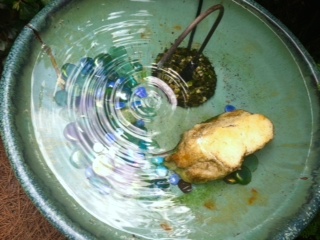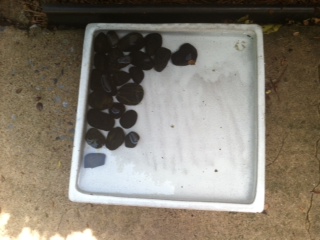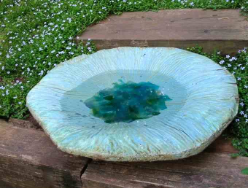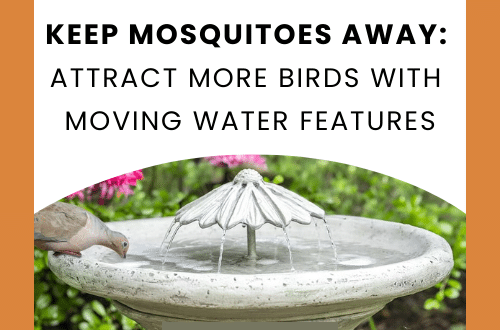The Deal with Stones in Your Birdbath
 You hear it all the time… or maybe not? Adding a large rock or stones to your birdbath helps birds. It’s absolutely true, especially for juveniles venturing out into the world after springs’ nesting season.
You hear it all the time… or maybe not? Adding a large rock or stones to your birdbath helps birds. It’s absolutely true, especially for juveniles venturing out into the world after springs’ nesting season.
Shallow, shallow, shallow is best, with a maximum depth of 2-3 inches. If your bowl is deeper – just don’t fill it all the way. While adult birds tend to maneuver with more agility, babies can easily drown in your birdbath if the water is too deep.
A recent post on this topic (on a social network) was shared far and wide because it was a good story. The person saw the bathing bird in distress, and slowly walked over with a stick, but the bird didn’t fly away – it remained in the bath struggling. When she gently extended the stick over the bath, the bird hopped right on it. After placing the stick to the ground, the bird hopped off… but could not fly. She immediately thought of a wildlife re-habber and called, but the bird eventually took flight.
thought of a wildlife re-habber and called, but the bird eventually took flight.
Drowning indeed he was, the water being too deep, with the sides of the bath too tall and steep for escape. The little guy was lucky someone was watching! Wet feathers can’t fly, this is why he hopped under the brush instead of flying to a nearby branch. It illustrates exactly why folks are always saying to put rocks or stones in your birdbath.
 Baths with a gentle slope or walk-in sides are easiest on birds because they imitate shallow pools or puddles found in nature. Texture is always helpful too, as it allows tiny feet the ability to grip.
Baths with a gentle slope or walk-in sides are easiest on birds because they imitate shallow pools or puddles found in nature. Texture is always helpful too, as it allows tiny feet the ability to grip.
The stones can be anything from colorful decorative ones, to a large natural rock, river rock, lava rock, or simply stones from the garden. Anything that allows birds to “hop up onto” will be used and appreciated by feathered friends. For better footing, landing and perching spots… and maybe even to save a life!

